TRAVAILS OF TRANSITION (PART ONE)
R56m destined for Eastern Cape wind farm beneficiaries ‘wasted’ on failed projects
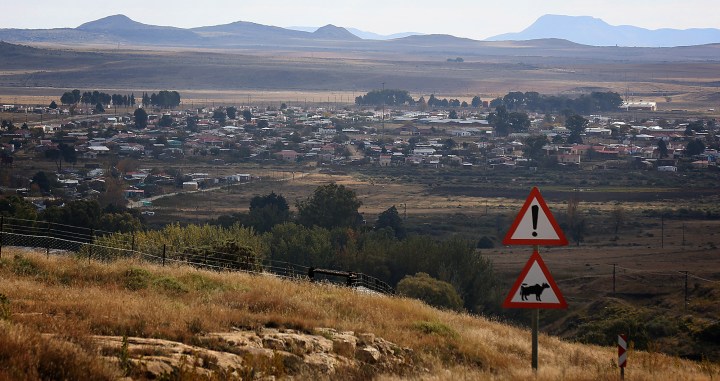
The first part of an Our Burning Planet investigation reveals that R56m meant to uplift the rural Eastern Cape communities of Molteno and Sterkstroom near the Dorper Wind Farm has been ‘wasted on failed projects’. As South Africa accelerates its nascent green energy transition, these residents and their doleful stories can be seen as a warning about how things can go wrong.
‘Properly managed, the energy transition will benefit all,” said President Cyril Ramaphosa in his fourth State of the Nation Address. Driven by climate change-related imperatives and spluttering, ageing energy infrastructure, South Africa is moving quickly to add hundreds of megawatts of cleaner, renewable energy capacity to its energy mix.
But owing to the opacity of operating many kilometres from the glare of South Africa’s metropolitan areas, even clean-power projects can be soiled by allegations of misuse and misallocation of money. Our Burning Planet’s months-long investigation into the travails of two rural Eastern Cape communities of Molteno and Sterkstroom — and the wind farm between them — provides one example of this.
From an industrial-sized laundry machine that has sat idle for years, a sports programme that was condemned to failure from the outset, to a pigsty that was never to be — these and other projects are unfortunate examples of how small towns and their residents — supposed beneficiaries of South Africa’s broader energy transition — can often be misled and sold false promises.
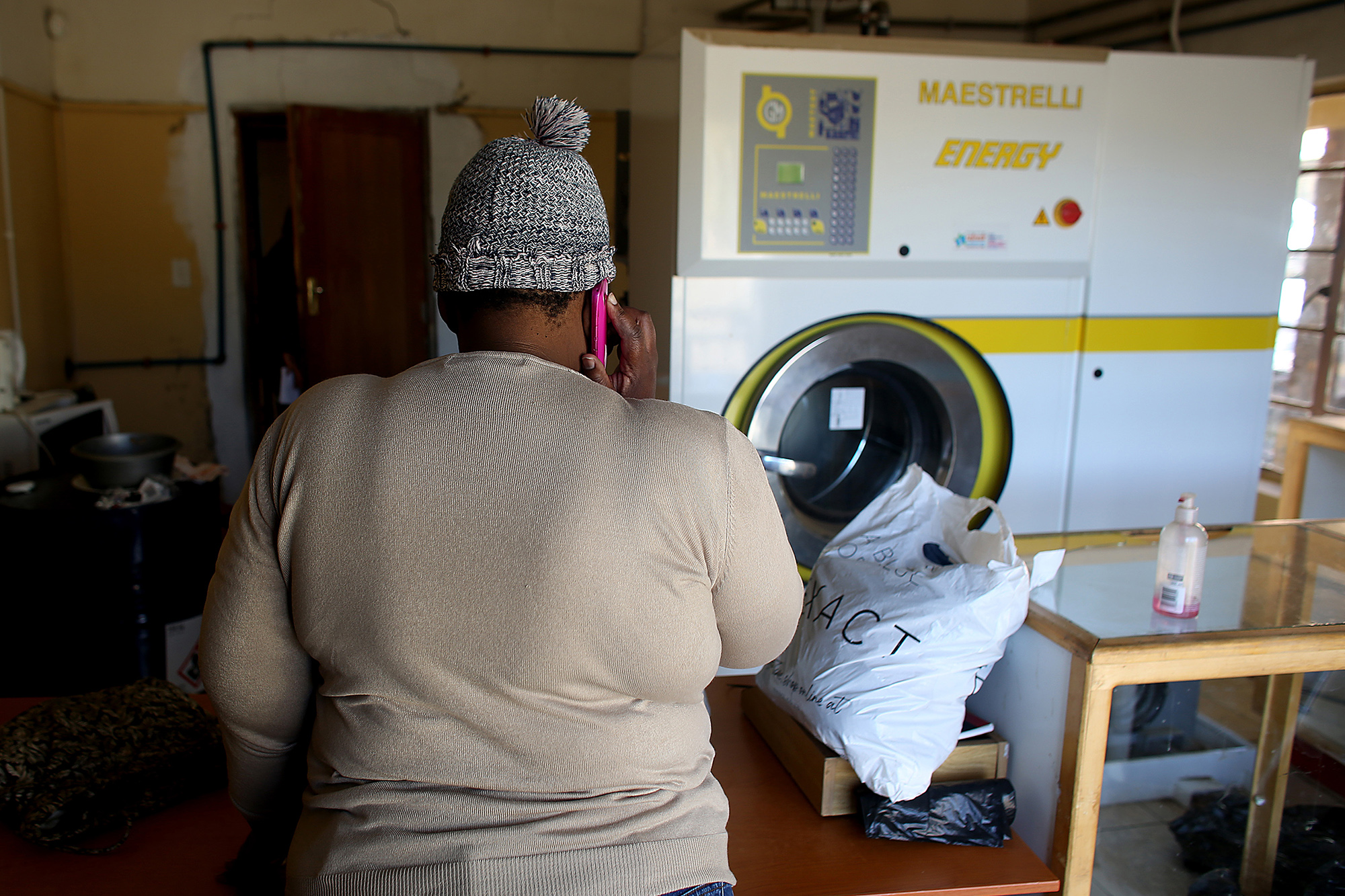
Expensive machinery like this industrial washing machine stands idle at the Laundromat in Molteno. (Photo: Mark Andrews)
This is the story of Molteno, Sterkstroom and the Dorper Wind Farm, which might serve as a cautionary tale about the things that could go wrong in far-flung towns during the country’s nascent green energy transition.
Not missing, but wasted
“… money did not go missing. It was just wasted on unsuccessful projects.”
This is according to Mamoso May, CEO of the Dorper Wind Farm, speaking after residents at a 2021 stakeholder engagement meeting raised the issue of money spent on enterprise development projects.
This remains wholly unpalatable to many locals who have since told Our Burning Planet that the operations and methods of the Dorper Wind Farm and its subcontractors have left them hundreds of thousands of rands in the red, while others note that few of the wind farm’s interventions have ended in success and meaningful impact on the community, despite millions allegedly spent.
At the meeting, Mamoso said “a list of projects is available as well as how much has been spent on each project”.
However, residents who spoke to Our Burning Planet alleged that the Dorper Wind Farm has been opaque and has operated in a paperless environment so as to obfuscate its financial misconduct. Requests by both Our Burning Planet and residents to see this “list of projects” have been met with silence or otherwise ignored by May and Dorper Wind Farm employees.
Socioeconomic and enterprise development
The Dorper Wind Farm’s web page says it exists “to provide sustainable clean energy from renewable resources providing a Return on Investment to our shareholders and investing in the communities of Molteno and Sterkstroom”. The latter part is based on mandated community development requirements.
The Independent Power Producer Procurement Programme (IPPPP) office in the Department of Mineral Resources and Energy describes these requirements as “an important focus” of the IPPPP, aimed at ensuring the build programme “secures sustainable value for the country and enables local communities to benefit directly from the investments attracted into the area”.
“Economic development and socioeconomic development requirements are set out in the Request for Proposals and are based on a bespoke scorecard that is developed specifically for the IPP Procurement Programme, and is adjusted as required for each bid window, after consultation with National Treasury and the Department of Trade, Industry and Competition,” the IPPPP office said.
“Bid obligations are structured into seven categories, namely local content, job creation, ownership, management control, preferential procurement, enterprise development and socioeconomic development. [Independent power producers] are required to contribute towards Enterprise Development and Socioeconomic Development initiatives in their respective communities. These contributions are spent in areas such as education, health, social welfare and enterprise development.”
According to the Department of Mineral Resources, at the end of March 2022, independent power producers had contributed more than R578.8-million and R1.9-billion towards enterprise development and socioeconomic development initiatives, respectively, in communities.
It said the economic development commitments are regulated through the implementation agreement between the department and the independent power producers, adding that “the threshold commitment for socioeconomic development spend is 1% of revenue”.
This has not gone as planned in the case of Molteno and Sterkstroom.
A complaint by residents sent to the Public Protector noted: “As part of the bid requirements for the licence, Dorper Wind Farm committed to spending approximately 2% of revenue on community development for the communities of Molteno and Sterkstroom in terms of the [Renewable Independent Power Producer Programme]; with the intention of developing the local economy, creating jobs and ensuring skills development, among other elements.”
Red flags
Our Burning Planet has seen a number of documents related to the Dorper Wind Farm and its engagements with the relevant communities. In addition to its official “Information Session Minutes”, dated 21 May 2021, our engagements with residents and an analysis of a trove of documents raised several red flags.
According to the minutes, in 2020 Dorper Wind Farm CEO May visited Molteno and Sterkstroom where she realised there was a gulf between “what was happening on the ground versus what was reported to Dorper.” As a result, Dorper decided to replace LifeCo Unltd – a company hired to implement its enterprise development and socioeconomic development projects because Dorper lacked in-house capacity – with another service provider called KD Strategies.
Many of the unsuccessful projects had been overseen by LifeCo. Yet, despite this, May is recorded as having said that “due to not having enterprise development agreements in place with those contracted service providers Dorper thought were the experts, there is no legal president [sic] to hold them accountable for any of the money spent.”
May went on to cite the example of a dry cleaner “who was paid R760,000 for dry-cleaning machinery which has to date not worked due to the lack of a three-phase electricity connection”.
Pat Pillai, the founder of LifeCo, told this reporter that the notion that May’s contention that she only became aware of the challenges once on the ground was a distortion of the truth.
In a letter to the chairperson and director of the Dorper Wind Farm, which Our Burning Planet has seen, Pillai explains that “Dorper/the CEO pre-approved the development plans (projects) and the activity budget – and only upon approval would Dorper transfer the necessary funds” and “any payment exceeding R50 000 was approved by Dorper/the CEO before payment was made” among others.
KD Strategies took over the reins, but just seven months into a multiyear agreement with Dorper its contract was terminated because the wind farm management wanted to engage with the community directly. This is despite some community members saying KD was “doing a good job”. The decision to end the contract early is now the subject of an arbitration process.
The projects
Our Burning Planet has, through interviews and trawling available documents, begun to draw up a list of projects the Dorper Wind Farm has funded.
Outside a dilapidated building housing the town’s laundromat, a sign proudly reads: “Dorper Wind Farm.” From outside the smell of laundry detergent wafts from filled bathtubs and the tell-tale signs of construction are all over the building. Inside, a large Maestrelli 350-P dry-cleaning machine sits in the middle of the room, unused and surrounded by other equipment.
Fundiswa Dyoba, who runs the Molteno Laundry Service, told Our Burning Planet about her disappointment with the Dorper Wind Farm.
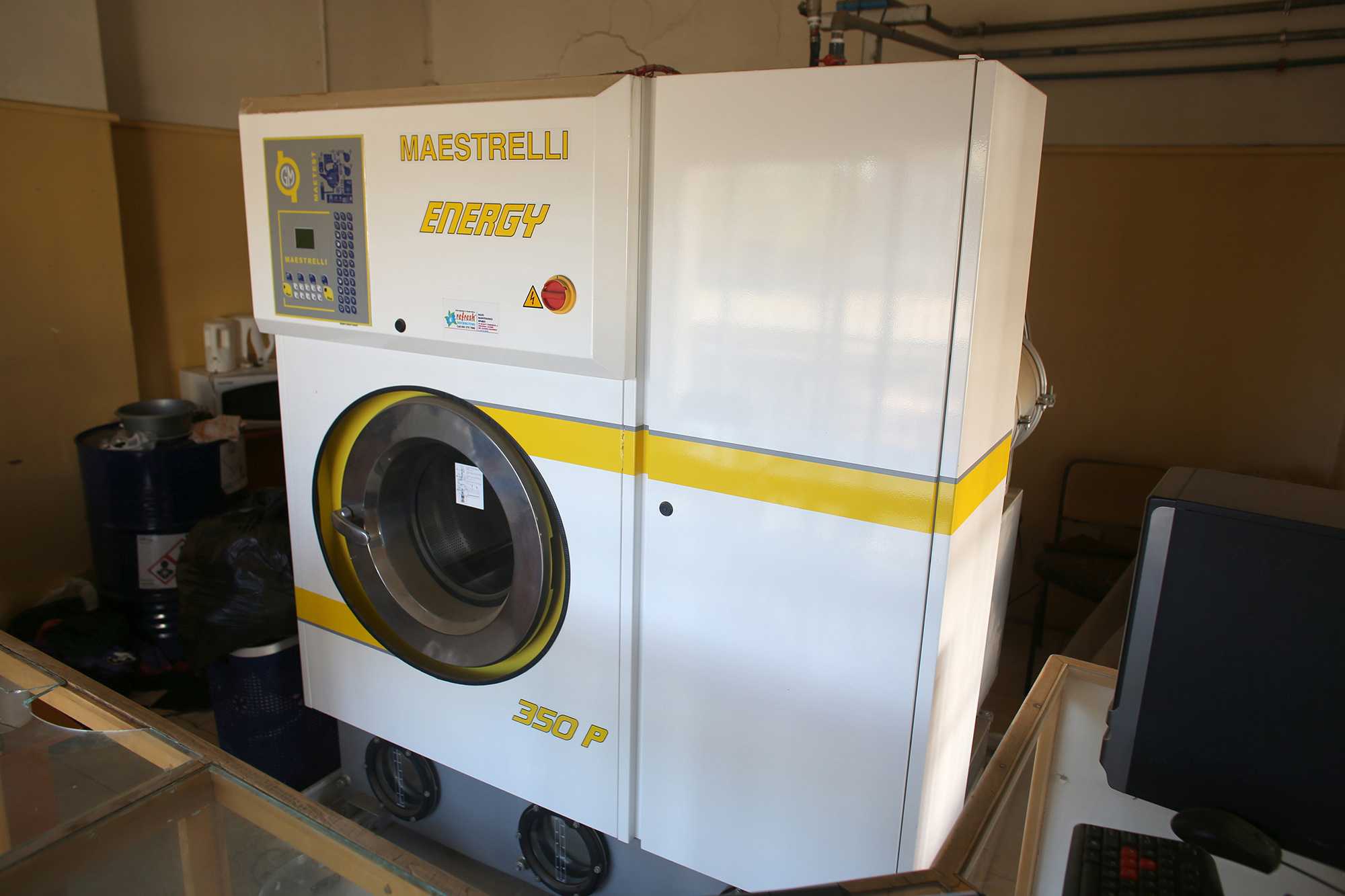
Expensive machinery like this industrial washing machine stands idle at the laundromat in Molteno. (Photo: Mark Andrews)
Dyoba said that after the machine arrived, “the service provider that was here said we can’t use the machine here because our electricity is two-phased. Dorper must buy a transformer for us so that we have our own transformer here. Since 2015, 16, 2017 when the machine arrived, we have not used a machine since. And Dorper said they are taking a machine to Pretoria, it has been sold there.
“I went to Komani to buy a small machine and a dryer. I am waiting for the machine to go so that I can use my own machine. They broke the wall and had to [re]build it and they are going to break it again to take the machine out.
“Dorper did nothing good in Molteno,” she said.
Our Burning Planet has seen a letter of intent signed on 23 January 2021 by May which, among other statements, said: “We confirm that, given that the equipment has remained unused since 2016, it is in the best interest of the project that Dorper Wind Farm take possession of the equipment that are currently in your possession. We will also be taking possession of the chemicals — in order to safely [dispose] thereof.”
More than 18 months later, the machine still takes up room in the laundromat.
George Joja, another resident, said in exasperation: “So, when you look at this community, you see no millions… here we don’t have what you call… a youth centre, Dorper [was] supposed to build a youth centre, Dorper doesn’t even care about the youth.
“So for me as… a man that is doing… a lot of things… because I can even teach children like drama, ballroom and Latin America [dancing] and all those things, you understand… to bring the youth back [but] where are we going to go here?
“So Dorper has failed this community, that’s all I can say.”
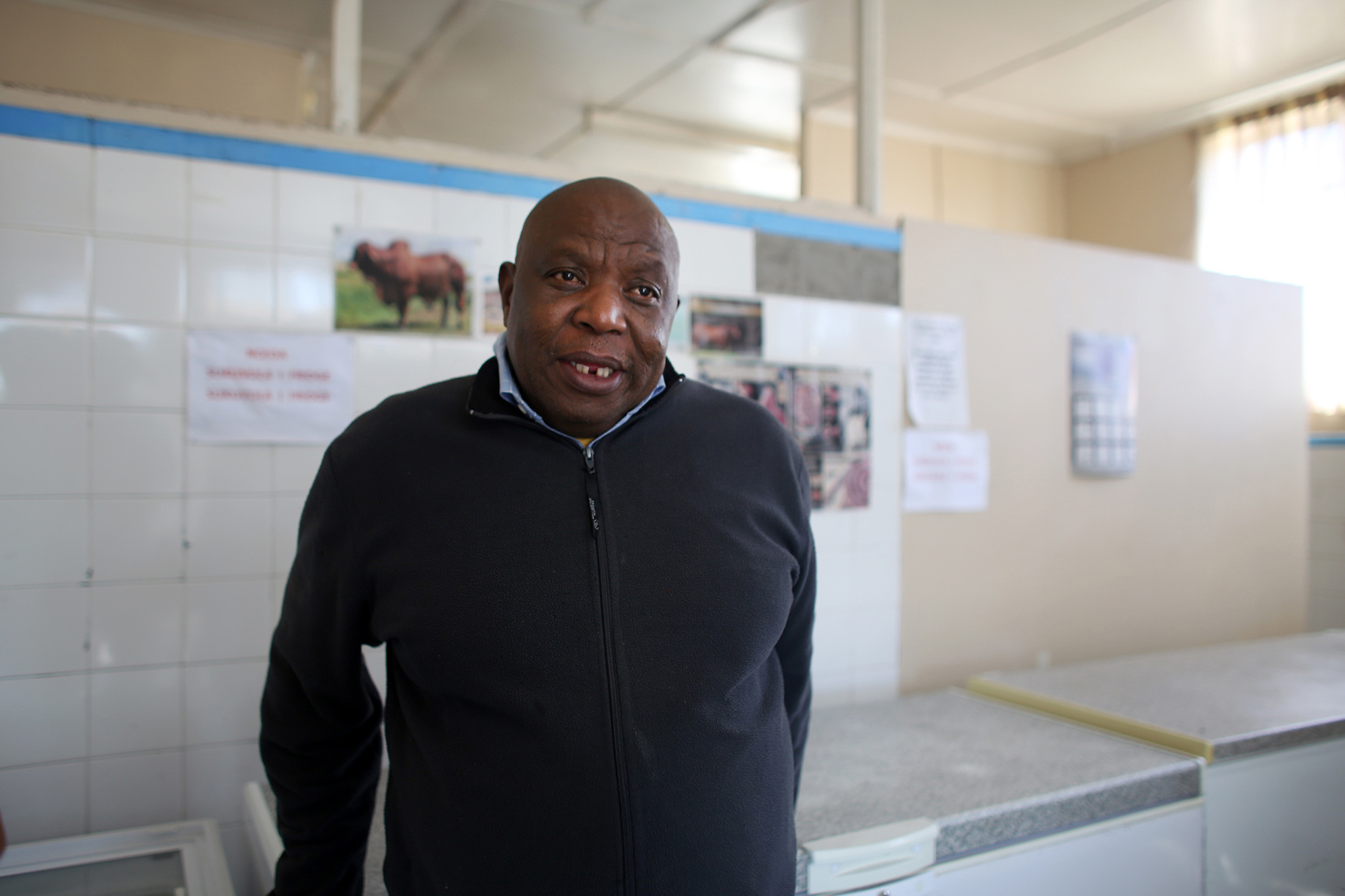
Amos Jikijela has a dream to provide low-cost meat, like pork, to the residents of Molteno and says while the assistance from Dorper Wind Farm is good, it isn’t enough to turn his dream into reality. (Photo: Mark Andrews)
Amos Jikijela, a community leader and business owner, was one of the people who initially thought Dorper’s intervention in the town would be a good thing. “Dorper initially came here and painted themselves as good messiahs.” He said he approached the Dorper Wind Farm with a proposal to build a pigsty as his butchery would be able to sell pork, a less-expensive meat, to the residents of the impoverished area. Given assurances that he would be supported, he spread the news in the community.
“It affected my health badly,” said Jikijela, explaining that when the Dorper Wind Farm and its subcontractors abruptly withdrew their support, he was seen as a liar and purveyor of false hope to a hope-starved community. Today, he sits in his office a step away from fridges supplied by the Dorper Wind Farm, bare and without much to show despite being promised substantial support.
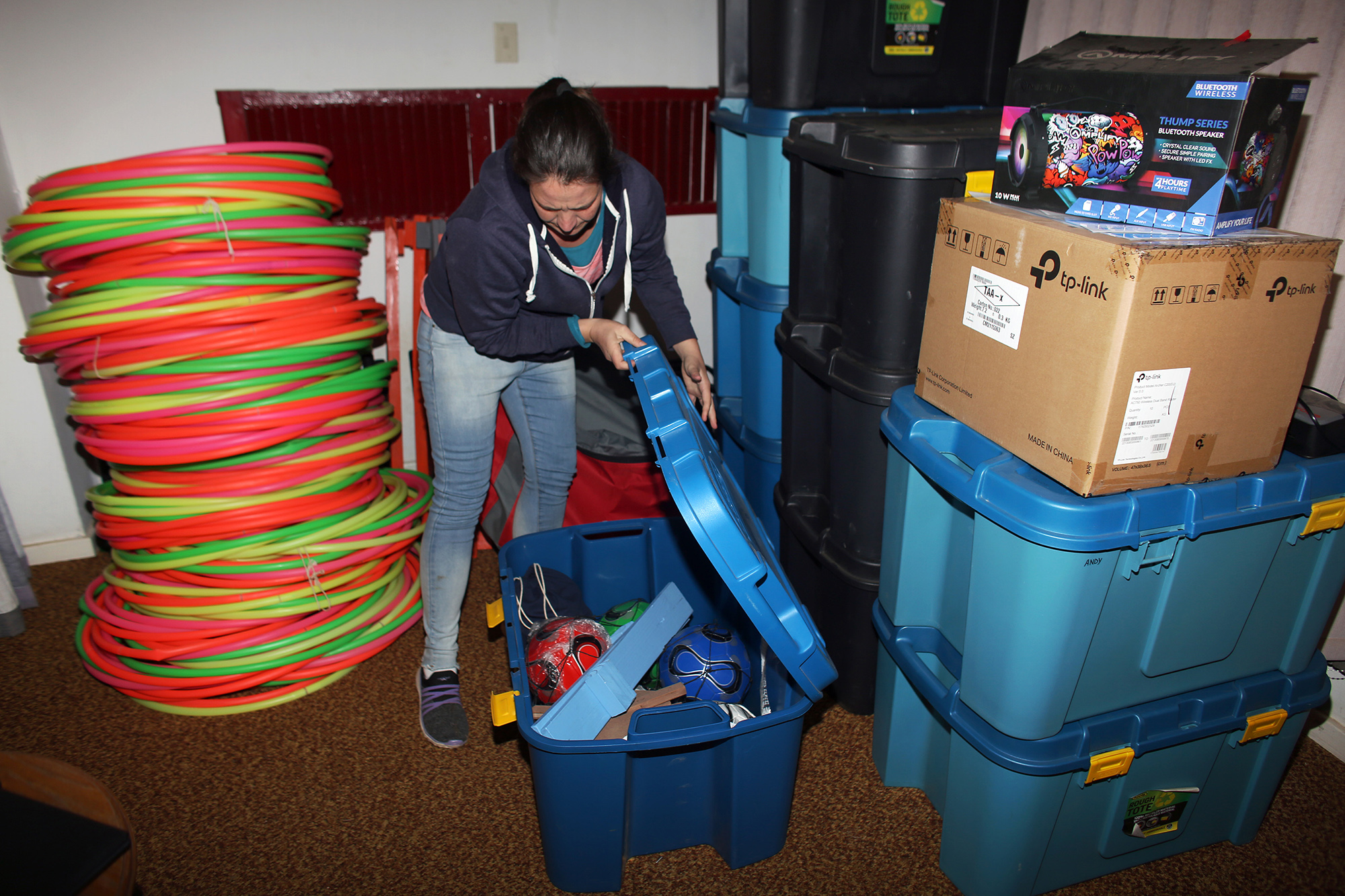
Liana van Lill with unused sporting equipment. (Photo: Mark Andrews)
Liana van Lill’s life has been made measurably worse by one of the farm’s “unsuccessful projects”. Representatives of the Dorper Wind Farm “approached me last year [2021] to do a movement programme at the primary schools in Molteno and Sterkstroom. After the proposal was approved we started implementing the programme at the schools [at the] end of August.
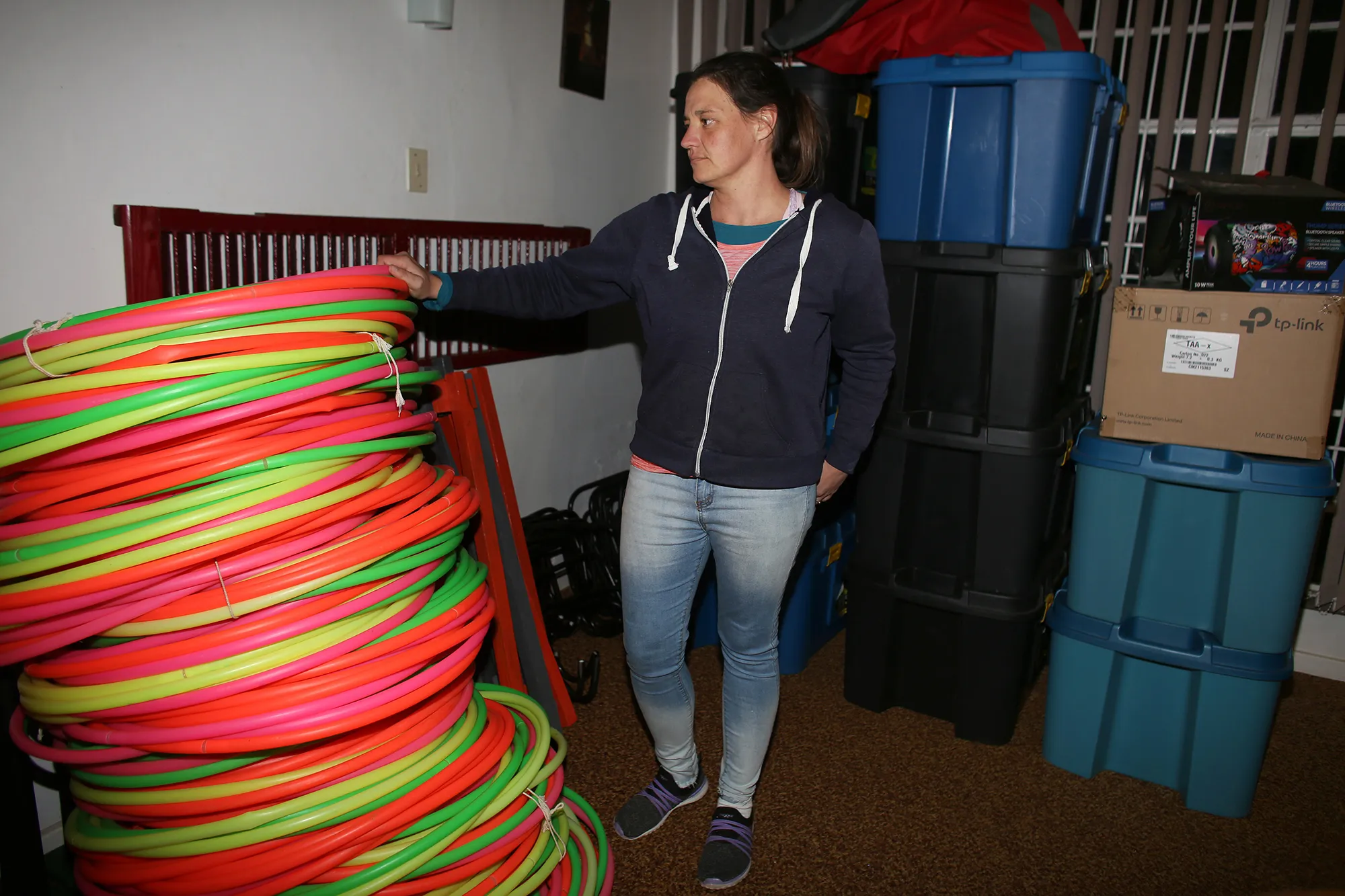
Liana van Lill with unused sporting equipment. (Photo: Mark Andrews)
“Despite the fact that the programme was still in its early stages in December and after various discussions about the holidays even before the programme started, and the schools that were very satisfied with the programme and the efforts made, Dorper Wind Farm started withholding payments.
“We have not been paid from December 2021. This is the only income for nine rural ladies who worked with me as coaches. The contract was for a six-month trial period, but they cut it short by not paying from December (after only four months). Now I am sitting with all the equipment, no income for me or the nine coaches. We can not afford lawyers to approach them,” said Van Lill.
“Dorper is now trying to discredit us by saying we are in breach and that we owe them money, but we have all the hard evidence to prove otherwise. Dorper Wind Farm owes Bounce & Move [Van Lill’s company] a total of R260,846.50,” she said.
Asked to respond to the various allegations and to provide the aforementioned documents that detail the successes and failures of the Dorper Wind Farm’s projects, May said she was “somewhat perplexed about the questions raised”, and that, “to my mind, Dorper has stated its position”, referring to the minutes in which she is quoted as saying money had not been stolen, but wasted on unsuccessful projects.
“This position (which Dorper maintains), to my mind, addresses most of the questions raised,” said May.
While the wind farm may have failed in many respects to uplift the community to the degree it had promised, it was not without its benefits. The project created 229 jobs for South African citizens during construction, offset more than 486,928 tons of CO2 as of March 2016, and provided power to 144,543 households.
Ramaphosa, in announcing his “energy action plan” recently, said the government would double the amount of new generation capacity procured through Bid Window 6 for wind and solar power from 2,600MW to 5,200MW.
As South Africa accelerates its pivot into a post-fossil fuel epoch, the inhabitants of these communities and their doleful stories can be seen as a warning about how things can go wrong in the remote, sun- and wind-resource-rich corners of the country. OBP/DM
Disclosure: This story was amended to reflect the comment received from LifeCo and Pat Pillai. The paragraph “Our Burning Planet sought a response from LifeCo, but is yet to receive one.” has been removed.


















 Become an Insider
Become an Insider
The government’s renewable energy programme to promote power generation (REIPPP) incorporates several features designed to ensure that local communities benefit from the activities of independent power producers (IPPs). One is that IPPs are required to spend a percentage (typically between 1% and 2,5%) of their annual revenues on programmes promoting social and economic development (SED) in the local community. Another is that local communities must participate in the ownership of independent power producers (IPPs). In almost all cases, the vehicle chosen for that participation is a community trust with the local community as its nominated beneficiary. Dividends received by the community trust from its IPP should be used for projects and initiatives which uplift the community. The sad reality – 10 years after the launch of the REIPPPP – is that there are very few examples of local communities which have benefitted meaningfully from SED spend by IPPs or their community trusts. There are many factors contributing to this sorry state of affairs. IPPs are businesses which construct and then operate complex renewable energy plants; they are seldom equipped to design and implement programmes which will uplift local communities. And at least some of them view their SED obligations as a requirement of their licences to operate, and treat SED as a compliance issue. Turning to community trusts, few of them have delivered on their potential to become co-investors in the development processes of their communities. In some cases, this is because the community trust is saddled with debt incurred in order to acquire its stakes in the IPP. In other cases, the community trust lacks the capacity and expertise to make good use of whatever money is at its disposal. And, sadly, there are instances where community trusts are seen as merely serving the interests of their IPPs and as a result have failed to gain the trust of their communities. Dorper Wind Farm seems to have fallen victim to one or more of these challenges.
It noticeable that not one of the categories in the ‘bid obligations’ include skill, technical competence or track record. No wonder these projects fails. They are but low hanging fruit for shysters and crooks.